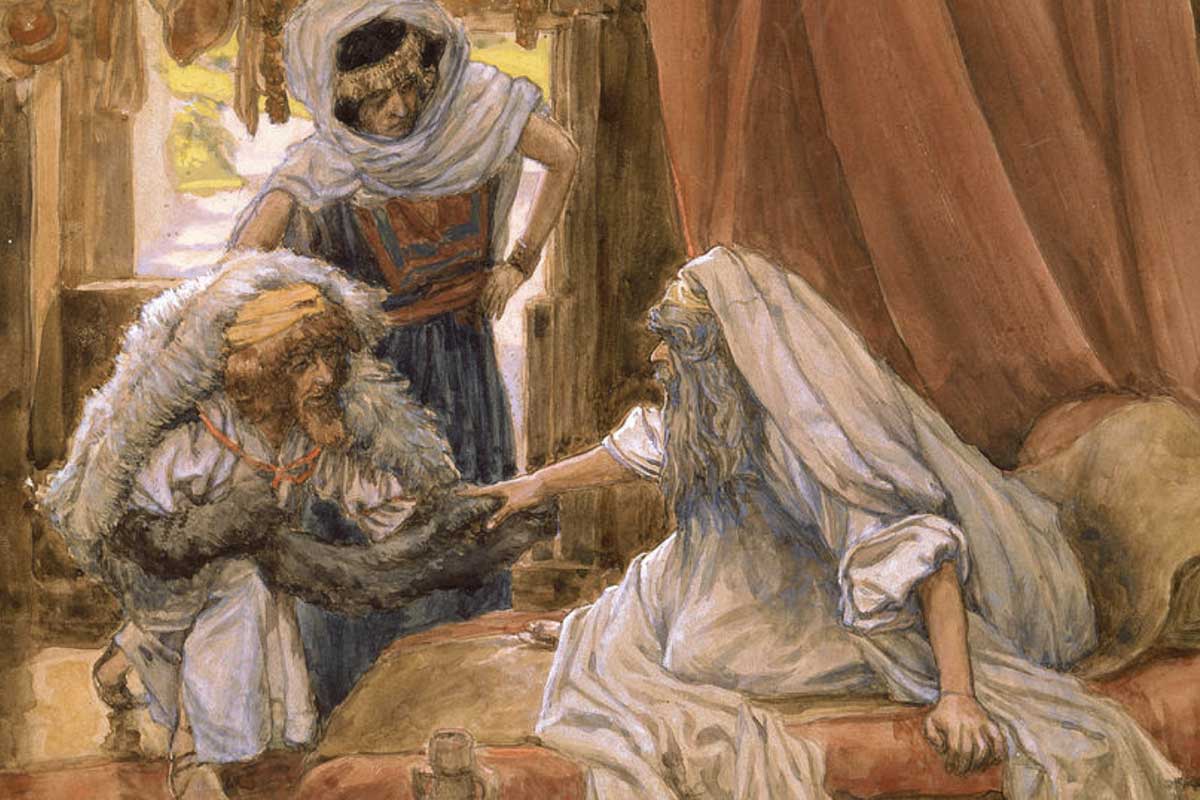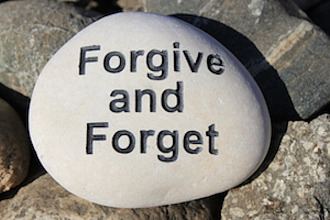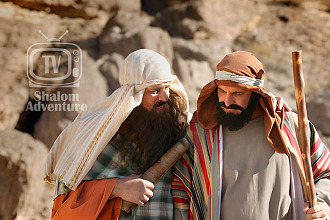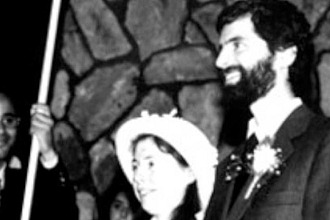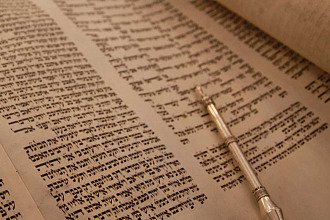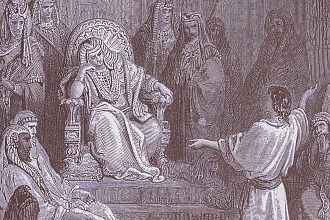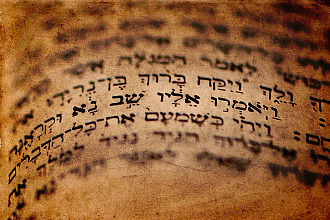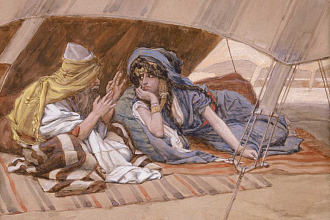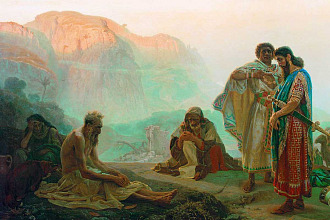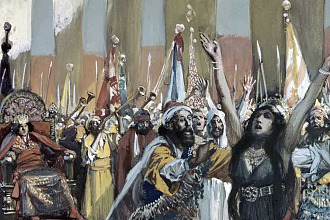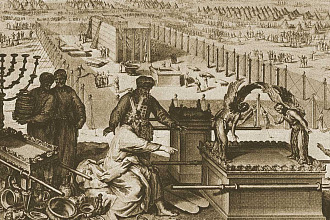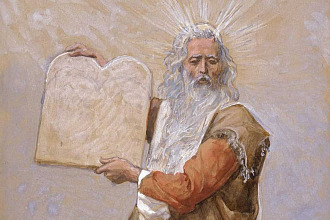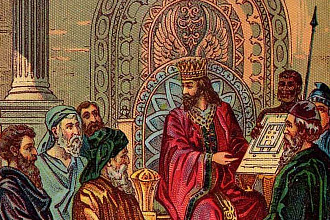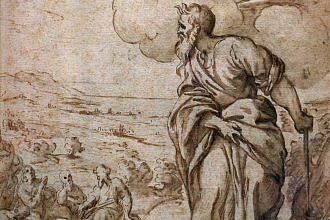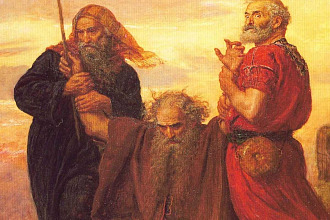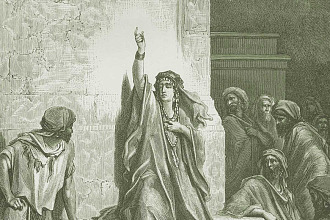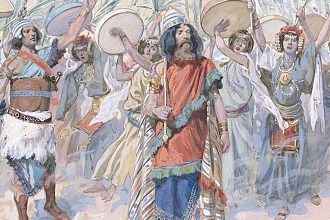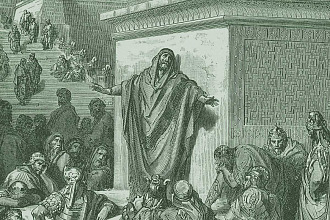We often say the phrase “the God of Abraham, Isaac, and Jacob.” In the last lesson we learned about Abraham and Isaac, but who is Jacob and what role did he play in establishing the nation of Israel?
What lessons can we learn from Jacob’s life to help us in our walk with Elohim (God)? Let’s look in the Torah and find out.
1. Abraham and Sarah had a miracle child, Isaac. Isaac married a beautiful girl with a lovely disposition. Her name was Rebekah. When Rebekah became pregnant with twins, they seemed to struggle in her womb. In her distress she inquired of the Lord. How did God respond?
...the Lord answered her, “Two nations are in your womb, two separate peoples shall issue from your body; one people shall be mightier than the other, and the older shall serve the younger.” Genesis 25:23
The older serving the younger was totally contrary to the traditional order. Generally, in the time of our patriarchs, the first born son was held in high esteem.
2. Who were these twin brothers? Which one was younger?
The first one emerged…Esau. Then his brother emerged…Jacob. Genesis 25:25, 26
Esau was named Esau because he had a lot of red hair. When Esau came out of the womb Jacob, who was still in the womb, was holding on to Esau’s heel. Isaac thought this was cute so he named him Jacob, which means heal grabber, tripper, surplanter.
3. The custom of birthright gave the oldest son a double portion of the inheritance and he was assigned the spiritual leadership of the family. God had already indicated, when the children were in the womb, that Jacob would receive this birthright. What event during their lives showed Esau’s passion for immediate satisfaction and Jacob’s interest in the long-range benefits of the birthright?
Once when Jacob was cooking a stew, Esau came in from the open, famished. And Esau said to Jacob, “Give me some of that red stuff to gulp down, for I am famished”… Jacob said, “First sell me your birthright.” And Esau said, “I am at the point of death, so of what use is my birthright to me?”…Jacob then gave Esau bread and lentil stew; he ate and drank, and he rose and went away. Thus did Esau spurn the birthright. Genesis 25:29-34
God did not force Esau to spurn the birthright, but because God knew in advance what Esau would choose, He prophesied that the older would serve the younger. Esau cared more about the temporal, immediate satisfaction of a bowl of soup than he did about the benefits that the birthright would give him in the future. Jacob, on the other hand, was looking for ways to fulfill God’s prophecy. The account of God speaking to his mother about the older serving the younger might have been his favorite bedtime story when he was a child.
4. Disregarding God’s prophecy concerning Jacob and overlooking Esau’s indifference to the birthright, what did Isaac attempt to do?
When Isaac was old and his eyes were too dim to see, he called his older son Esau and said… go out into the open and hunt me some game. Then prepare a dish...and bring it to me to eat, so that I may give you my innermost blessing before I die.” Genesis 27:1-4
Isaac seemed to favor Esau. Esau was his first-born; Esau was a real man—a hairy hunting man, while Jacob was a soup cooker with his mother. In spite of what the angel had said, Isaac determined to give his inner most blessing to Esau.
5. While Esau was out hunting, how did Rebekah encourage Jacob to deceive his father Isaac into giving him the blessing that went along with the birthright?
Rebekah said to her son Jacob… Go to the flock and fetch me two choice kids, and I will make of them a dish for your father, such as he likes. Then take it to your father to eat, in order that he may bless you before he dies.”Genesis 27:6, 9, 10
Still holding on to the prophesied promise of many years before, Rebecca sought to fulfill God’s promise in her own way. In Lesson 1 we saw how Abraham tried to fulfill God’s promise by having an adulterous relationship with Hagar. Now we see how Rebecca tried to fulfill God’s promise by lying. This is an important point to remember: we never need to break one of God’s commandments (mitzvot) in order to fulfill one of God’s promises.
6. How did Jacob voice his resistance to his mother’s plan?
“But my brother Esau is a hairy man and I am smooth-skinned. If my father touches me, I shall appear to him as a trickster and bring upon myself a curse, not a blessing.” But his mother said to him, “Your curse, my son, be upon me! Just do as I say and go fetch them for me.” Genesis 27:11-13
Jacob did not resist his mother’s plan because he knew it was wrong, but because he thought it was a bad plan. He was not worried about hurting God or his father, but about being caught.
7. Jacob submitted and went along with the deception. As he brought the meal to Isaac, Isaac tested him several times to see if he was really Esau. Jacob lied each time. Isaac finally blessed Jacob, thinking he was Esau. Just as Jacob left, Esau came in. When Esau found out what had happened he was so furious he threatened to kill Jacob. In her desperation, what plan did Rebekah come up with next?
Now, my son, listen to me. Flee at once to Haran, to my brother Laban. Genesis 27:43
Rebecca and Jacob succeeded in getting the blessing but they did not get it according to God’s plan. There would be consequences to their lie. Rebecca proclaimed, “your curse be upon me.” Rebecca never saw her son again after that fateful day. The scriptures do not tell us how God would have stopped Isaac from giving the blessing. God could have called out from Heaven at the last second as He did when Abraham was about to sacrifice Isaac. Although we don’t always know how God will fulfill His promises, we do know that He will. We don’t have to sin to help Him do it, or justify sinning because the end result is the fulfillment of God's plan. As we learned with Abraham, God is rarely early but He is never late!
8. Jacob set out for Haran, never again to see his mother. He wandered alone in the wilderness, distressed with the guilt of his deception. In what way did God give Jacob assurance of His love and mercy?
He had a dream; a stairway was set on the ground and its top reached to the sky, and angels of God were going up and down on it. And the Lord was standing beside him and He said, “I am the Lord, the God of your father Abraham and the God of Isaac…Your seed shall be as the dust of the earth… and in thy seed shall all the families of the earth be blessed. And, behold, I am with you...” Genesis 28:11-15 (verse 14 & 15 from the Holy Scriptures, Hebrew Publishing Company, 1930 version)
Oh, the mercy and love of God! God did not come to Jacob with condemnation or with a load of guilt. Rather He renewed the promise that Jacob’s seed, his posterity, would bless all the families of the earth. (The fulfillment of this all-important promise will be seen in the next few lessons). Like Jacob’s grandfather Abraham, Jacob did not have any children when this promise was given to him.
God promised Jacob that He would be with him. Jacob was not a hunter. He was a homeboy. Being alone in the wilderness must have been a very frightening experience for him. God’s promise that He was with him must have been very comforting. What a loving God we have. Even when we blow it and are all alone because of our mistake, we don’t have to be afraid, because God is with us!
9. How did Jacob respond to this powerful encounter with God?
Jacob awoke from his sleep and said, “Surely the LORD is present in this place, and I did not know it!” Shaken, he said, “How awesome is this place! This is none other than the abode of God, and that is the gateway to heaven.” …He named that site Bethel…Jacob then made a vow, saying, “the LORD shall be my God…of all that You give me, I will set aside a tithe for You.” Genesis 28:16-19. NOTE: Beth-el means “house of God”
Possibly for the first time in Jacob’s life He had a personal experience with God. Jacob’s faith and belief in what God promised him caused him to respond with praise and thanksgiving. He also determined to act upon his faith by giving back to God 10%, a tithe, of all that God would give him the ability to earn. When we have a real experience with God it will cause faith in God to well up in us and cause us to respond with praise, gratitude, and obedience.
10. Finally, after a long journey, Jacob came to a well near the land of Haran, where a group of shepherds introduced Jacob to Rachel, Laban’s daughter. Jacob went to live and work with Laban’s family. What did Jacob request when Laban asked him what wages he desired?
“I will serve you seven years for your younger daughter Rachel.” So Jacob served seven years for Rachel and they seemed to him but a few days because of his love for her. Genesis 29:18, 20
11. After the seven years Laban deceived Jacob and gave him his older daughter Leah as his wife. What comes around goes around. Jacob the deceiver was deceived. When Jacob protested, Laban promised Jacob that he could have Rachel also for an additional seven years of service. During the twenty years Jacob worked for Laban, Laban continually changed Jacob’s wages. What did God instruct Jacob to do at this difficult time?
…the Lord said to Jacob, “Return to the land of your fathers where you were born, and I will be with you.”Genesis 31:3
As bad as the situation was with Laban, going home must have been a scary thought. Jacob had not seen his brother in 20 years. He must have been wondering: “Has he forgiven me? Will he accept me? Is Esau still angry? Will he try to hurt me?”
12. How did God faithfully show love and concern for Jacob and his family in their journey back to Jacob’s home?
Jacob went on his way, and angels of God encountered him. When he saw them, Jacob said, “This is God’s camp.” Genesis 32:2, 3
God never leaves us or forsakes us. As the Psalmist sang, “the Angel of the Lord encamps around about those who fear Him.”
13. When Jacob came close to home he sent a message to Esau. What words did Jacob specifically tell his messengers to use showing that he was sorry for his past mistakes?
‘To my lord Esau, thus says your servant Jacob: I stayed with Laban and remained until now… I send this message to my lord in the hope of gaining your favor.’ Genesis 32:5, 6
Jacob could have said, “Remember God said you would serve me. Remember you sold me your birthright. Remember dad blessed me.” But no, he came humbly and repentantly.
14. When Esau received the message he came after Jacob with 400 men. He obviously was still angry, even 20 years later. This frightened Jacob. He split his camp to protect them. Then he went to pray. What did he say to God, showing his repentance for his sin?
“…O Lord…I am unworthy of all the kindness that You have so steadfastly shown Your servant: with my staff alone I crossed this Jordan… Deliver me, I pray…” Genesis 32:10-13
Jacob was truly repentant. He surrendered himself into God’s hands. Jacob was not trying to hide, deny, or excuse his sins. He was determined to follow God’s plan, even in the face of fear and danger.
15. The next day Jacob sent 550 animals in small groups, one after another, to Esau as a peace offering. What happened to Jacob that night that changed his life forever?
Jacob was left alone. And a man wrestled with him until the break of dawn. When he saw that he had not prevailed against him, he wrenched Jacob’s hip at its socket, so that the socket of his hip was strained as he wrestled with him. Then he said, “Let me go, for dawn is breaking.” But he answered, “I will not let you go, unless you bless me.” Said the other, “What is your name?” He replied, “Jacob.” Said he, “Your name shall no longer be Jacob, but Israel...” Genesis 32:25-29. NOTE: Israel literally means Prince with God, prevailed with God, or overcame with God.
16. With what words did God show Jacob that both God and Esau had forgiven his sin?
“As a prince with God you have striven with God and man, and have prevailed.” Genesis 32:29 (margin)
Jacob prevailed in holding on when everything seemed against him. This actual physical wrestling match was symbolic of Jacob’s inner wrestling with the guilt he bore for tricking his brother and lying to his father. He prevailed in receiving God’s forgiveness through his repentance. Through God’s power Jacob’s character had changed from one that grabbed, tricked, and lied to one that overcame with God’s power. Thus God changed his name from Jacob, which means “supplanter,” to Israel, which means “Prince with God” or “prevailer with God.”
Each of us needs to have a time of “wrestling” with God. It is not wrestling against God it is wrestling against our natural tendencies to do wrong, think wrong, and have wrong motives. In the “wrestling” match God is not wrestling against us He is wrestling with us. He is on our side against our past mistakes and sins. That is why God had to dislocate Jacob’s hip. Jacob had to come to the point where he realized that he could not stand on his own—He needed God to hold him up. Jacob needed to understand that he could not face Esau in his own strength he could only do it with God’s help. Jacob needed to understand he could not wrestle and win against his natural tendencies to sin, he needed God to give him the victory. God is not wrestling against us; God is wrestling with us, on our side, as we wrestle with the thoughts of whether or not we can trust God with every aspect of our lives, whether or not we should surrender to him, whether or not we should have total faith in what the Bible says, whether or not we should follow what He says, whether or not we should get rid of things in our lives that are hindering our walk with God. We need to hold on to God and not let go until we have His blessing, His assurance that we have the victory, the peace that we have made the right choices for Him.
17. Who was this “man” that Jacob wrestled with?
So Jacob named the place Peniel…(understood as “face of God”). Genesis 32:30 (margin)
God initially appeared to Jacob as a man. Jacob might have thought it was Esau or one of Esau’s men. He wrestled with him. Somewhere in the struggle Jacob realized this “man” was actually God in human form and He refused to let go unless God blessed him. Jacob called the place “face of God” honoring and acknowledging that it was God who he was wrestling with, and who had blessed him, and who had changed his character and name.
18. When Jacob again showed humility and sorrow for his sin how did Esau demonstrate his emotions?
Jacob…bowed low to the ground seven times until he was near his brother. Esau ran to greet him. He embraced him and, falling on his neck, he kissed him; and they wept. Genesis 33:1, 3, 4
This must have been a very touching moment when Esau, the big, burley, angry warrior, cried on his brother’s neck. Jacob’s humility and repentance before God and Esau won his brother over. Humility and repentance before God and those we associate with can bring reconciliation to the strained relationships in our lives.
19. God instructed Jacob to go back to Bethel, the place where God appeared to him in a dream when he had fled from his brother. How did Jacob and his family respond to this call of God?
“Come, let us go up to Bethel, and I will build an altar there to the God who answered me when I was in distress and who has been with me wherever I have gone.” They gave to Jacob all the alien gods that they had, and the rings that were in their ears, and Jacob buried them. Genesis 35:3, 4
As Jacob and his family grew closer to God they got rid of the things in their lives that distracted them from God. We see in Jacob’s life a continual growing with God. He does not have only one massive experience with God, he has several encounters with Him. Jacob must have heard about God from his parents. Jacob experienced God when he was alone under the stars running away from his home because of his sin. He encountered the angels of God when he was on his way back home from his uncle Labin’s house. Jacob came face to face with God as he wrestled with Him before meeting up with his brother. Then over 14 years from his first real experience with God Jacob is still drawing closer to God and getting rid of more things that draw him away from God. So should it be with us. We should not rely only on our past experience with God. We need to be continually, even daily growing with God and having experiences with Him through prayer and the reading of His word. Even if we have had an experience with God for 14 or more years we can still grow closer to God and there are still other things in our lives we should be burying or getting rid of. Even if we have read about Abraham, Isaac, and Jacob before there are still more lessons we can learn from their lives as we apply the biblical principles to our lives today. What is there in your life that should be discarded, buried, given up, or forgotten?
20. In each of our lives there needs to come a day of wrestling with God for the forgiveness of past mistakes, as Jacob did. What assurance does God give through the Hebrew prophet Jeremiah, speaking of our prevailing with God?
Why have all faces turned pale? Ah, that day is awesome; there is none like it! It is a time of trouble for Jacob, but he shall be delivered from it. In that day—declares the Lord of Hosts—I will break the yoke from off your neck and I will rip off your bonds. …they shall serve the Lord their God and David, the king whom I will raise up for them. Jeremiah 30:6-9
As we face our guilt and our fears it may seem like a time of trouble, but God has promised to break our bondage to sin and guilt and cause us to serve God. Israel (Jacob) did not obtain the birthright because he was perfect. It was because he was humble enough to admit his mistakes to God and to men. Israel (Jacob) overcame and prevailed, by God's power, from his wrong ways. Jacob repented of his wrong and submitted to God’s will for his life. God gave him the ability to stop doing things his own way and to start doing things God’s way. God can give you this same experience. He can change your life from wrong habits, words, and actions to Godly thoughts, words, and actions. Ask Him to give you a Godly sorrow for your past mistakes. Then ask Him to give you a humble spirit and the courage to admit when you have been wrong. Petition Him to give you the power not to repeat those mistakes again.
This lesson is adapted from "Jewish Discoveries," by Jeff Zaremsky, to buy the printed book, click here.

